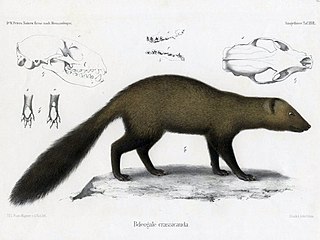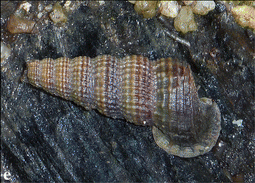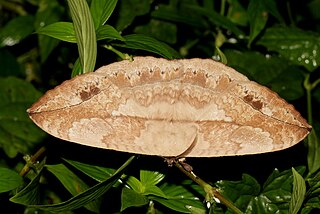
Acinonyx is a genus within the Felidae family. The only living species of the genus, the cheetah, lives in open grasslands of Africa and Asia.

Cyanopica is a genus of magpie in the family Corvidae. They belong to a common lineage with the genus Perisoreus.

Streptopelia is a genus of 15 species of birds in the pigeon and dove family Columbidae native to the Old World in Africa, Europe, and Asia. These are mainly slim, small to medium-sized species. The upperparts tend to be buffy brown and the underparts are often a shade of pinkish-brown, and they have a characteristic black-and-white patch on the neck. They have cooing or purring songs, monotonous in some, restful and soothing in others. The genus divides into two groups, the collared dove group with uniform upperparts and a black half-collar edged with white, and the turtle dove group with patterned upperparts and a barred side panel on the neck. They range in size from the 20–23 cm red collared dove to the 33–35 cm oriental turtle dove. Most of the species are resident or disperse over short distances, but two are long-distance migrants breeding in temperate areas and wintering in the tropics. The sexes are not differentiated in most of the species, except for the red collared dove, where the males are orange-red with a greyish head, and the females a duller brown.

Philipp Christoph Zeller was a German entomologist.

Bdeogale is a mongoose genus that was proposed by Wilhelm Peters in 1850 based on a mongoose specimen collected in Mozambique. Bdeogale species have compact paws with four symmetrical toes, round ears and a blunt muzzle with a broad round and bare rhinarium. The genus contains four species that are primarily terrestrial and omnivorous and forage in dense vegetation.

The Polyceridae are a taxonomic family of sea slugs, dorid nudibranchs, marine gastropod mollusks within the superfamily Polyceroidea.

Cycnorhamphus is a genus of gallodactylid ctenochasmatoid pterosaur from the Late Jurassic period of France and Germany, about 152 million years ago. It is synonymous with the genus Gallodactylus.

Chromodorididae, or chromodorids, are a taxonomic family of colourful sea slugs; dorid nudibranchs, marine gastropod mollusks in the superfamily Doridoidea. “Chromodorid nudibranchs are among the most gorgeously coloured of all animals.” The over 360 described species are primarily found in tropical and subtropical waters, as members of coral reef communities, specifically associated with their sponge prey. The chromodorids are the most speciose family of opisthobranchs. They range in size from <10mm to over 30 cm, although most species are approximately 15–30 mm in size.

Lepicerus is a genus of myxophagan beetles containing three described species in the family Lepiceridae; it is the only extant genus in the family, with another genus, Lepiceratus only known from fossils. Extant species occur in the Neotropics, from Mexico south to Venezuela and Ecuador. Fossils referrable to the genus are known from the early Late Cretaceous of Southeast Asia.

Cerithium is a genus of small to medium-sized sea snails, marine gastropod molluscs in the family Cerithiidae, the ceriths.

Hydrochus is the only living genus of beetle in the family Hydrochidae, which belongs to the superfamily Hydrophiloidea, and was formerly treated as a subfamily of Hydrophilidae. Hydrochus includes about 180 species, which are found worldwide. The name "Hydrochus" has also been used for a fly genus in the family Dolichopodidae, but this is a junior subjective synonym of the genus Rhaphium.

The Facelinidae are a taxonomic family of colorful sea slugs. These are specifically aeolid nudibranchs. They are marine gastropod molluscs.

Oreta is a genus of moths belonging to the subfamily Drepaninae. The genus was erected by Francis Walker in 1855.

Cerithidea is a genus of medium-sized sea snails or mud snails, marine gastropod mollusks in the family Potamididae, the horn snails.

Clypeomorus is a genus of sea snails, marine gastropod mollusks in the subfamily Cerithiinae of the family Cerithiidae.

Polymesoda is a genus of clams in the family Cyrenidae. The genus was previously classified in the family Corbiculidae, before it was subsumed into Cyrenidae.

Gastrochaena is a genus of saltwater clams, marine bivalve molluscs in the family Gastrochaenidae. The type species of this genus is Gastrochaena cuneiformis.

Stereognathus is an extinct genus of tritylodontid cynodonts from the Middle Jurassic of the United Kingdom. There is a single named species: S. ooliticus, named after the Great Oolite deposits of England. A second species, S. hebridicus, was named after the Hebrides in Scotland, where it was found; it was synonymized with S. ooliticus in 2017.

Rhamphorrhina bertolonii is a beetle belonging to the family Scarabaeidae. The species was first described by Hippolyte Lucas in 1879.

Eupterote is a genus of moths in the family Eupterotidae. It was first described by Jacob Hübner in 1820.



















